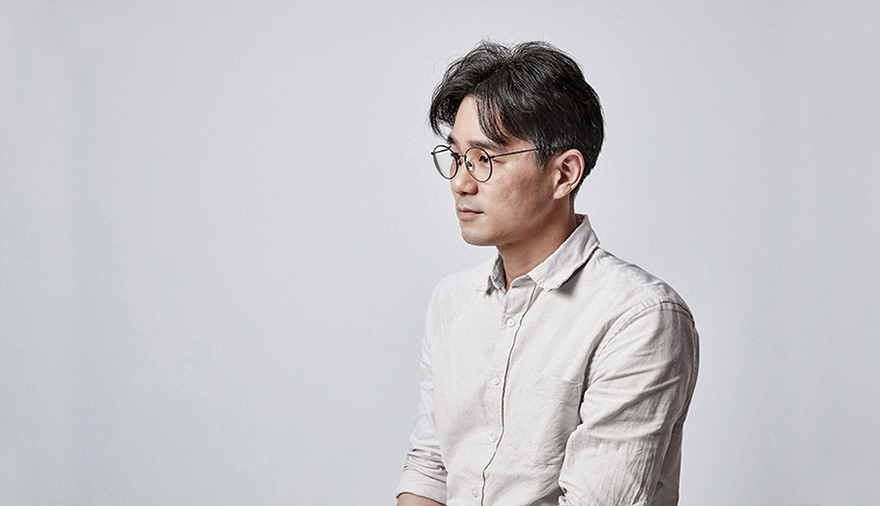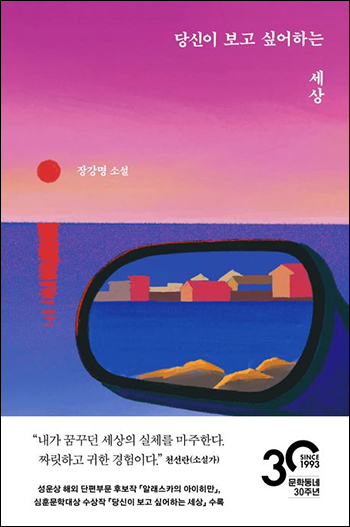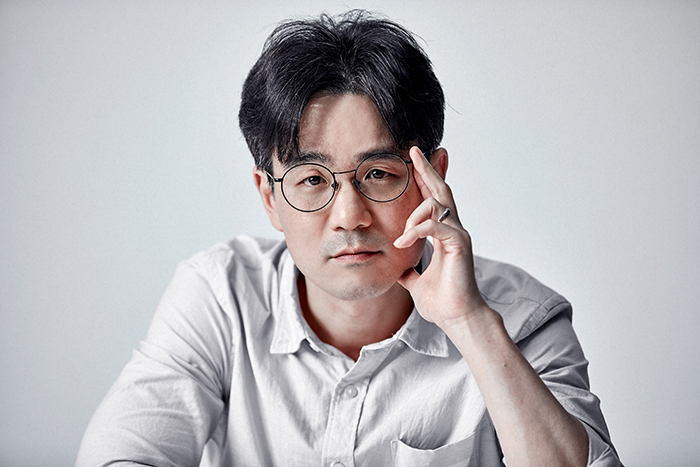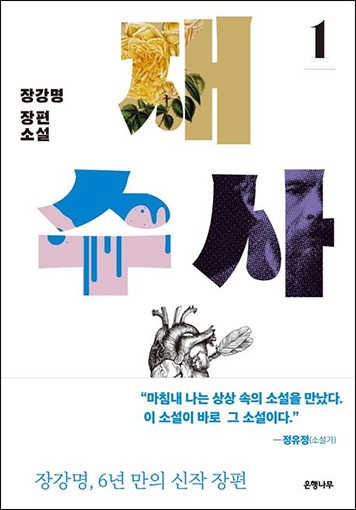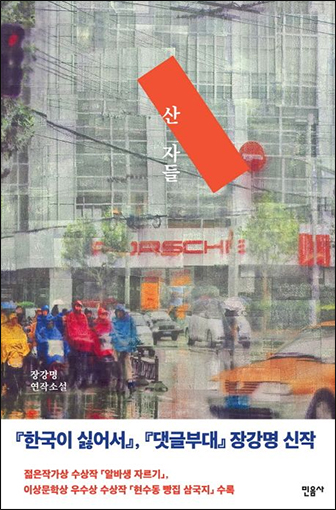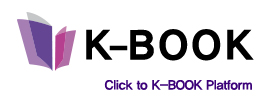|
Korean Authors
Writer Chang Kang-myoung Literature is the fine art of addressing human suffering
2023.10.04
There is a novelist who persistently delves into the issues of contemporary Korean society - writer Chang Kang-myoung. As he says that literature is the fine art of addressing human suffering, Chang Kang-myoung deems it his responsibility as a novelist to talk about that suffering. Following is an interview with writer Chang, who focuses on telling the stories of the pain of himself and those around him, which he knows best, as we, the modern people, cannot understand the suffering of people who lived 50 or 100 years ago.

It’s an honor to have you with us on K-Book Trends. Please briefly introduce yourself to our readers.
Hello, everyone. I’m novelist Chang Kang-myoung. I made my debut as a novelist after working as a newspaper journalist for 11 years. As a journalist, I trained myself to write assiduously based on interviews with a clear sense of issues, and that is how I also write my novels. I have written many realistic novels featuring contemporary Korean society, but I don’t necessarily stick to realism - I often write science fiction and fantasy as well.

You have recently released the short-story collection The World You Want to See (Munhakdongne). Could you give us a brief introduction to the book and your feelings about it?
It is a collection of seven of my most recent science fiction short stories. They describe how technologies that might actually be developed in the near future affect our lives, social institutions, and cultures in ways that their developers never intended. So, there is no interstellar travel, time travel, aliens, or hyperspace.
The latest book by Chang Kang-myoung –

Among the stories in the collection, The World You Want to See won the Top Prize of the Sim Hun Literary Award, and Eichmann in Alaska was shortlisted for the Nebula Awards, a Japanese literary award, in the foreign short story category. What do you think it was about each of your stories that won them awards and nominations?
I was quite surprised by both, as I didn’t have any expectations at all. And I think the works were well received because they directly targeted real-life issues that readers in Korea and Japan are living with right now.

You have a keen interest in how technology is changing society. In your fiction, your views often seem to be negative or with reserved judgment. Are there any areas you see as optimistic, and if so, what are they?
As I wrote in the Author’s Note for The World You Want to See, some technologies become part of the social system by being tightly coupled with social institutions and customs. New technologies can shake up the underpinnings of those systems and reshape existing power relations, making them a weapon for marginalized groups and a setback for vested interests. Social Media is an example of this. While I’m a huge critic of it, it’s undeniable that Social Media has given a voice to the marginalized and publicized issues that traditional mass media hasn’t paid attention to.
I mainly write realistic novels that address contemporary Korean society.

Writing about contemporary Korean issues seems to be part of your mission as a novelist. Why do you continue to write about contemporary Korean issues?
Literature seems to be a different genre than math or music, fields where young geniuses with no experience in life can achieve great things. Math and music seem to have more to do with some pure pattern than with human experience or suffering. But literature doesn’t, and there are no “child novel geniuses” to prove it.

We once heard you say, “We are what we see, we are what we read.” What are you seeing and reading these days?
I have been staying in Gapado, Jeju Island, for a while now. Here, I have been looking at the flat land, sea, sky, and the clouds. There are no tall buildings or terrain nearby, so I feel like it clears my mind because I can see everything in front of me no matter where I look.

So, it has been about 10 years since you became a full-time novelist, which is about the same as your 11 years as a journalist. How are the life, eyes, and writing muscles of a novelist different from those of a journalist?
There are a lot of different things. And I would like to talk about time, as I came to realize that I have been a full-time novelist for about as long as I have been a journalist.

Who are the writers that you love?
It’s kind of odd that I give the same answer every time I’m asked this question. So, this time, I’m going to tell you about the authors I recently discovered and fell in love with. For a Korean novelist, I would say Lee Seo-su, a fellow member of the literary circle “Monthly Pay Realism.” She is so good at writing novels that I envy her. For an international author, I would choose Turkish novelist Ömer Zülfü Livaneli. I recently read Balıkçı ve Oğlu (The Fisherman and His Son) and was deeply moved by it. It is an obvious story in some ways, but it kept me occupied throughout the book.
Because literature is the fine art of addressing human suffering,

Tell us about another work of yours that you feel is most Korean, but also relatable to international readers.
Since I mentioned The World You Want to See above, I would like to introduce Reinvestigation by EunHaeng NaMu, published last year, which is very Korean in two ways. The key elements of the novel are its realistic portrayal of the lingering effects of the Asian Financial Crisis in the 1990s on Korean society, and how investigations are conducted in Korea, a country with one of the highest levels of public safety and murder arrest rates in the world.
Reinvestigation and The Living

We heard that you are planning to write stories about pilots and people working in travel agencies facing COVID-19. How are things coming along? Can you tell us about any other stories you are also plotting, as well as your plans and goals for the future?
I have already written two short stories, one about the things a pilot experienced and another about a travel agent’s struggles during the COVID-19 pandemic.
#Chang Kang-myoung#Novelist#Realism#SF |
Pre Megazine
-

Jakkajungsin Publishing Co.
VOL.69
2024.04 -

Writer Yun Jung-Eun
VOL.69
2024.04 -

Jumping Books Publishing House
VOL.68
2024.03 -

Writer Kim Hwa-Jin
VOL.68
2024.03 -

Publisher Hyohyung
VOL.67
2024.02 -

Writer Minha
VOL.67
2024.02 -

Almond Publishing
VOL.66
2024.01 -

Writer Kwon Jung-Min
VOL.66
2024.01 -

Hakgojae Publishers
VOL.65
2023.12 -

Writer Kim Hye-Jung
VOL.65
2023.12 -

Eidos Publishing House
VOL.64
2023.11 -

Writer Hwang In-Chan
VOL.64
2023.11 -

Munhakdongne
VOL.63
2023.10 -

Writer Chang Kang-myoung
VOL.63
2023.10 -

Happywell Publishing
VOL.62
2023.09 -

Writer Baik Soulinne
VOL.62
2023.09 -

Dasan Contents Group (Dasan Books)
VOL.61
2023.08 -

Writer Lim Kyoung-Sun
VOL.61
2023.08 -

SpringSunshine Publishing Co.
VOL.60
2023.07 -

Writer Lee Kyung-Hye
VOL.60
2023.07 -

Human Cube
VOL.59
2023.06 -

Doctor Jeong Jae-Seung
VOL.59
2023.06 -

Anonbooks
VOL.58
2023.05 -

Writer Son Bo-Mi
VOL.58
2023.05 -

Namhaebomnal
VOL.57
2023.04 -

Writer Kim Bo-Young
VOL.57
2023.04 -

Hugo Publishing
VOL.56
2023.03 -

Writer Cho Kwang-Hee
VOL.56
2023.03 -

Balgeunmirae Publishing Co.
VOL.55
2023.02 -

Writer Lee Byung-Ryul
VOL.55
2023.02 -

Wisdom House, Inc
VOL.54
2023.01 -

Writer Jeong Jia
VOL.54
2023.01 -

Humanitas
VOL.53
2022.12 -

Writer Kim Yeon-Su
VOL.53
2022.12 -

Songsongbooks
VOL.52
2022.11 -

Writer Eun Hee-Kyung
VOL.52
2022.11 -

Bombom Publishing Co.
VOL.51
2022.10 -

Writer Jiwon Yu
VOL.51
2022.10 -

Hangilsa Publishing Co., Ltd.
VOL.50
2022.09 -

Writer Kim Won-Young
VOL.50
2022.09 -

Moksu Publishing Company
VOL.49
2022.08 -

Writer Yoo Sun-Kyong
VOL.49
2022.08 -

Next Wave
VOL.48
2022.07 -

Writer Park Sang-Young
VOL.48
2022.07 -

A Thousand Hopes
VOL.47
2022.06 -

Writer Bora Chung
VOL.47
2022.06 -

Woongjin ThinkBig
VOL.46
2022.05 -

Dr. Oh Eun-Young
VOL.46
2022.05 -

JECHEOLSO Publishing House
VOL.45
2022.04 -

Writer Jang Ryu-Jin
VOL.45
2022.04 -

Changbi Publishers
VOL.44
2022.03 -

Writer Kim Ho-Yeon
VOL.44
2022.03 -

Mati Books
VOL.43
2022.02 -

Writer Lee Kkoch-Nim
VOL.43
2022.02 -

Picturebook Gongjackso
VOL.42
2022.01 -

Writer Kim Sang-Wook
VOL.42
2022.01 -

Writer So-yeon Park
VOL.42
2022.01 -

Writer Yoo Eun sil
VOL.42
2022.01 -

Kungree Press
VOL.41
2021.12 -

Writer Kim Lily
VOL.41
2021.12 -

Writer Park Yeon-jun
VOL.41
2021.12 -

Writer Yi Hyeon
VOL.41
2021.12 -

A deeper world told through picture books 'Iyagikot Publishing (Story Flower)'
VOL.12
2019.06 -

Author Jeon Min-hee
VOL.12
2019.06 -

Illustrator Kim Hwan-Young
VOL.13
2019.07 -

Travelers sailing through the sea of knowledge - 'Across Publishing Group Inc.'
VOL.13
2019.07 -

Genre Novel Publisher 'Arzak Livres'
VOL.14
2019.08 -

Author Lee Yong-han
VOL.14
2019.08 -

Wookwan Sunim
VOL.15
2019.09 -

East-Asia Publishing
VOL.15
2019.09 -

Author Jo Jung-rae
VOL.16
2019.10 -

EunHaeng NaMu Publishing
VOL.16
2019.10 -

Writer Heo Kyo bum
VOL.40
2021.11 -

Writer Kim So-Young
VOL.40
2021.11 -

Author-illustrator Kim Sang Keun
VOL.40
2021.11 -

ACHIMDAL BOOKS
VOL.40
2021.11 -

Author Kang Gyeong-su
VOL.17
2019.11 -

Moonji Publishing Belongs to the Literary Community
VOL.17
2019.11 -

Author Kim Yun-jeong
VOL.18
2019.12 -

I-Seum
VOL.18
2019.12 -

Kim Cho-Yeop
VOL.19
2020.02 -

Creating a window into the future with books
VOL.19
2020.02 -

Author Serang Chung
VOL.20
2020.03 -

Hey Uhm
VOL.20
2020.03 -

Writer Lim Hong-Tek
VOL.21
2020.04 -

BIR
VOL.21
2020.04 -

Writer Song Mikyoung
VOL.39
2021.10 -

Author-illustrator Kim Dong Su
VOL.39
2021.10 -

Writer Lee Seula
VOL.39
2021.10 -

Tabi Books
VOL.39
2021.10 -

Writer Kim Soo-hyun
VOL.38
2021.09 -

Author-illustrator Lee Myoung Ae
VOL.38
2021.09 -

Writer Hwang Sunmi
VOL.38
2021.09 -

Kidari Publishing Co.
VOL.38
2021.09 -

Writer Sohn Won-Pyung
VOL.22
2020.05 -

Woods of Mind's Books
VOL.22
2020.05 -

Writer Heungeul
VOL.23
2020.06 -

Gloyeon
VOL.23
2020.06 -

Maumsanchaek
VOL.24
2020.07 -

Winners of the 2021 Bologna Ragazzi Award
VOL.37
2021.08 -

Picture book artist Lee Suzy
VOL.37
2021.08 -

Author-illustrator Yi Gee Eun
VOL.37
2021.08 -

Hubble
VOL.37
2021.08 -

Writer Baek Se-Hee
VOL.25
2020.08 -

Bearbooks Inc.
VOL.25
2020.08 -

Author Baek Hee-Na
VOL.26
2020.09 -

Yuksabipyoungsa
VOL.26
2020.09 -

Writer Kang Hwa-Gil
VOL.27
2020.10 -

Kinderland (Bandal)
VOL.27
2020.10 -

Writer Ha wann
VOL.36
2021.07 -

Author-illustrator Myung Soojung
VOL.36
2021.07 -

Writer Jung Yeo-Wool
VOL.36
2021.07 -

Publisher EcoLivres
VOL.36
2021.07 -

Writer Lee Geumi
VOL.28
2020.11 -

Sakyejul
VOL.28
2020.11 -

Writer Kim Keum-Hee
VOL.29
2020.12 -

Geulhangari
VOL.29
2020.12 -

Writer Cheon Seon-Ran
VOL.30
2021.01 -

Hyang Publishing House
VOL.30
2021.01 -

Writer Lee Hee-Young
VOL.31
2021.02 -

Sanzini
VOL.31
2021.02 -

Publisher Prunsoop
VOL.32
2021.03 -

Writer Sim Yun-Kyung
VOL.32
2021.03 -

Hanbit Media
VOL.35
2021.06 -

Hyeonamsa
VOL.33
2021.04 -

Author-illustrator Noh Inkyung
VOL.33
2021.04 -

Writer Cho Won-Jae
VOL.35
2021.06 -

Writer Kim Jung-Mi
VOL.34
2021.05 -

Safehouse Inc.
VOL.34
2021.05


